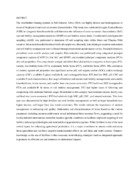| dc.description.abstract | The smallholder farming systems in Sub-Saharan Africa (SSA) are highly diverse and heterogeneous in terms of biophysical and socio-economic characteristics. This study was conducted in upper Eastern Kenya (UEK) to categorize farm households and determine the influence of socio-economic characteristics (SeC) and soil fertility management practices (SFMP) on soil fertility across farms. Conditioned Latin hypercube sampling (cLHS) was performed to determine 69 soil sampling sites within Meru and Tharaka Nithi counties. From each household (whose field soil sample was obtained), data relating to resource endowment and soil fertility management were collected through a household questionnaire survey. Standard laboratory procedures were used to analyse soil samples. Data reduction was performed using categorical principal component analysis (CATPCA) (for SeC and SFMP) and standard principal component analysis (PCA) (for soil properties). Two-step cluster analysis identified three distinct farm categories or farm types (FT), namely, low fertility farms (FT1), moderately fertile farms (FT2), and fertile farms (FT3). The correlation of clusters against soil properties was significant across pH, soil organic carbon (SOC), cation exchange capacity (CEC), available P, plant available K, and exchangeable bases. FT1 had low SOC, pH, CEC and available P (soil characteristics), low usage of fertilizer and manure (soil fertility management), and smaller household size, lower income, and smaller farm size (socio-economic). FT2 had lower SOC (compared to FT3) and available P. In terms of soil fertility management, FT2 had higher cases of fallowing and composting with moderate fertilizer usage. Households in this category had moderate income, family size, and land size (socio-economic). FT3 had relatively high SOC, pH, CEC, and mineral nutrients. This farm type was characterized by high fertilizer use (soil fertility management) as well as larger household size, higher income, and larger farm size (socio-economic). The results indicate the importance of nutrient management in enhancing soil quality. Delineation and characterization of farms based on the various parameters including resource endowment reveal imbalanced farm resource flows, suggesting a need for locally tailored interventions suited for location-specific conditions to facilitate improved targeting of soil fertility-enhancing technologies and sustainable crop production regimes. While fertilizer is one of the most critical inputs for enhancing agricultural production, it is a major contributor to nitrous oxide emissions from agriculture and can have negative environmental effects on soil biota and water sources. Farmers’ knowledge on the use of fertilizer is thus necessary in developing strategies (such as integrated approach) to promote its efficient use and minimize its detrimental impacts. | en_US |
